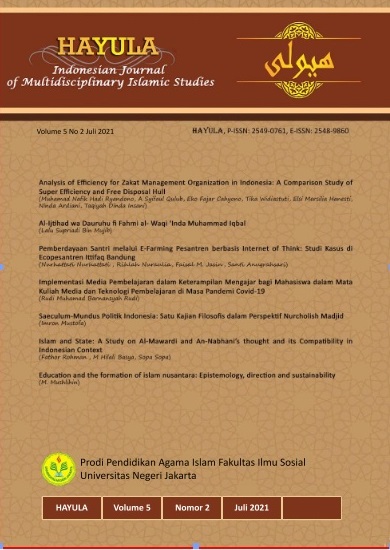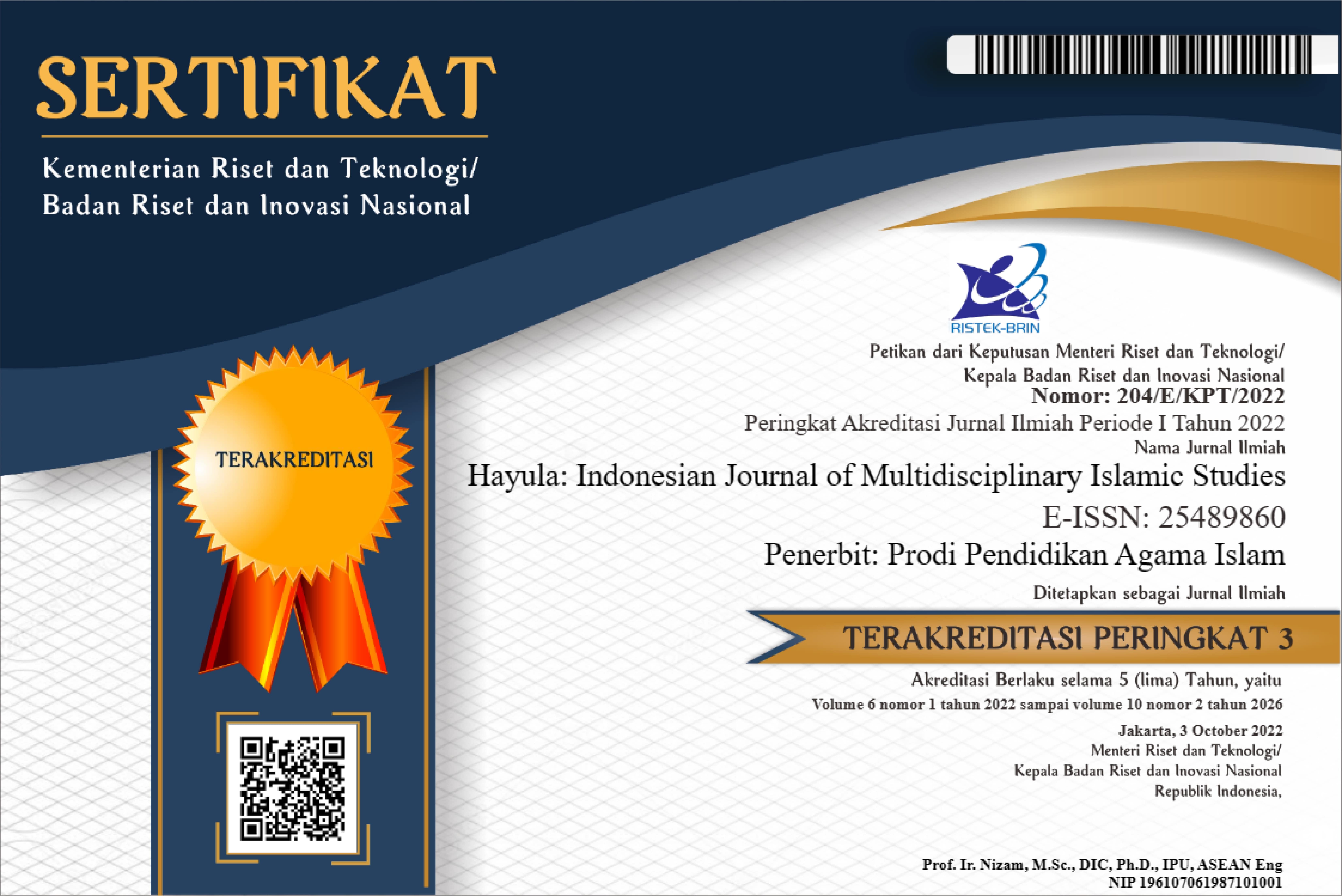Analysis of Efficiency for Zakat Management Organization in Indonesia: A Comparison Study of Super Efficiency and Free Disposal Hull
DOI:
https://doi.org/10.21009/005.02.01Keywords:
Efficiency, Free Disposal Hull, Super Efficiency, Zakat Management OrganizationAbstract
This research aims to analyze the efficiency level of fourteen Zakat Management Organizations (ZMO) in Indonesia. This study uses a quantitative approach with the method of Free Disposal Hull (FDH) and the Super Efficiency (SE) method. Socialization Expense, Operational Expense, and Salary Expense are the input variables, while zakah fund collection and zakah distribution become the output variables. Empirical findings show that ZMO Corp 4 has the highest efficiency level, which analyzed through both methods of FDH or SE. ZMO managed by the government is the most efficient ZMO compared to the others who managed by private group and social organization. Total Potential Importance (TPI) shows that the output variable that requires the most significant adjustment is the zakat distribution, which is 12.66%
References
Ali, M. M., & Ascarya. (2010). Analisis Efisiensi Baitul Maal Wat Tamwil Dengan Pendekatan Two Stage Data Envelopment Analysis (Studi Kasus Kantor Cabang BMT MMU Dan BMT UGT Sidogiri). TAZKIA: Islamic Finance & Business Review, 5(52), 110–125. http://dx.doi.org/10.30993/tifbr.v5i2.44
Amalia, N., & Widiastuti, T. (2020). Pengaruh Akuntabilitas, Transparansi, Dan Kualitas Pelayanan Terhadap Minat Muzaki Membayar Zakat. Jurnal Ekonomi Syariah Teori Dan Terapan, 6(9), 1756. https://doi.org/10.20473/vol6iss20199pp1756-1769
Andersen, P., & Petersen, N. C. (1993). A Procedure for Ranking Efficient Units in Data Envelopment Analysis. Management Science, 39(10), 1261–1264. https://doi.org/10.1287/mnsc.39.10.1261
Avkiran, N. k. (2004). Decomposing Technical Efficiency and Window Analysis. Studies in Economics and Finance, 22(1), 61–91. https://doi.org/10.1108/eb043383
BAZNAS. (2021). Outlook Zakat Indonesia 2021. Pusat Kajian Strategis - Badan Amil Zakat Nasional (PUSKAS BAZNAS).
Decree of the Minister of Religion Number 333 of 2015 concerning Guidelines for Granting Permits to Establish ZMOs, 1 (2015).
Ghazali, M. Z., Saad, R. A. J., & Wahab, M. S. A. (2016). A Conceptual Framework for Examining Trust towards ZMO. International Journal of Economics and Financial Issues, 6(S7), 98–102. http:www.econjournals.com
Hafidhuddin, D. (2002). Zakat Dalam Perekonomian Modern. Gema Insani.
Huda, N. (2016). Keuangan Publik Islam: Pendekatan Teoritis dan Sejarah (2nd ed.). Kencana. https://books.google.co.id/books?hl=id&lr=&id=CPSlDwAAQBAJ&oi=fnd&pg=PR1&dq=Keuangan+Publik+Islam:+Pendekatan+Teoritis+dan+Sejarah&ots=ubgVXGr7iL&sig=x9uI51bTm0YYwDvfDbkRgREpzgU&redir_esc=y#v=onepage&q=Keuangan Publik Islam%3A Pendekatan Teoritis dan Seja
Nasri, R., Aeni, N., & Haque, M. G. (2019). Determination of Professionalism and Transparency and Its Implications for the Financial Performance of ZMOs. Journal of Islamic Monetary Economics and Finance, 5(4), 785–806. https://doi.org/10.21098/jimf.v5i4.1158
Noor, A. H. M., Rahman, R. A., Yusof, R. M., & Ali, S. M. (2012). Assessing Performance of Nonprofit Organization: A Framework for ZMOs. British Journal of Economics, Finance and Management Sciences, 5(1), 12–22. https://doi.org/10.1613/jair.301
Rozalinda. (2016). Konsep Manajemen Sumber Daya Manusia : Implementasi Pada Industri Perbankan Syariah Rozalinda. Al-Masraf : Jurnal Lembaga Keuangan Dan Perbankan, 1(1), 107–124. http://journal.febi.uinib.ac.id/index.php/almasraf/article/view/28
Rusydiana, A. S. (2019). Efisiensi Sosial Dan Finansial Bank Syariah Di Indonesia: Pendekatan Nonparametrik. Riset Akuntansi Dan Keuangan Indonesia, 4(1), 13–24. https://doi.org/10.23917/reaksi.v4i1.6814
Ruysdiana, A. S., & Hasib, F. F. (2020). Super Efisiensi dan Analisis Sensitivitas DEA: Aplikasi Pada Bank Umum Syariah Di Indonesia. Amwaluna: Jurnal Ekonomi Dan Keuangan Syariah, 4(1), 41–54. https://doi.org/10.1017/CBO9781107415324.004
Saharuddin, D., Anggraini, R. T., & Jamila, S. (2019). Efficiency and Effectiveness of Zakat Payroll System and Digital Zakat on the Acceptance of Zakat Funds BAZNAS 2016-2017. Maqdis: Jurnal Kajian Ekonomi Islam, 4(1), 36–44.
Suud, F. M., & Madjid, A. (2020). Honesty: A Multidimensional Study as Motivation for National Character Building. Hayula: Indonesian Journal of Multidisciplinary Islamic Studies, 4(1), 99–116. https://doi.org/10.21009/004.01.06
Tulkens, H. (1993). On FDH Efficiency Analysis: Some Methodological Issues and Applications to Retail Banking, Courts, and Urban Transit. Journal of Productivity Analysis, 4(1–2), 183–210. https://doi.org/10.1007/BF01073473
Widiastuti, T., Cahyono, E. F., Zulaikha, S., Mawardi, I., & Al Mustofa, M. U. (2021). Optimizing Zakat Governance in East Java using Analytical Network Process (ANP): The Role of Zakat Technology (ZakaTech). Journal of Islamic Accounting and Business Research, 12(3), 301–319. https://doi.org/10.1108/JIABR-09-2020-0307
Yahaya, M. H., & Ahmad, K. (2019). Factors Affecting the Acceptance of Financial Technology among Asnaf for the Distribution of Zakat in Selangor - A Study Using UTAUT. Journal of Islamic Finance, Special Issue, 35–46.
Downloads
Published
How to Cite
Issue
Section
License
Authors who publish with this Journal agree to the following terms:
- Author retain copyright and grant the journal right of first publication with the work simultaneously licensed under a creative commons attribution licensethat allow others to share the work within an acknowledgement of the work’s authorship and initial publication of this journal.
- Authors are able to enter into separate, additional contractual arrangementfor the non-exclusive distribution of the journal’s published version of the work (e.g. acknowledgement of its initial publication in this journal).
- Authors are permitted and encouraged to post their work online(e.g. in institutional repositories or on their websites) prior to and during the submission process, as it can lead to productive exchanges, as well as earlier and greater citation of published works.
Users/public use of this website will be licensed to CC BY







